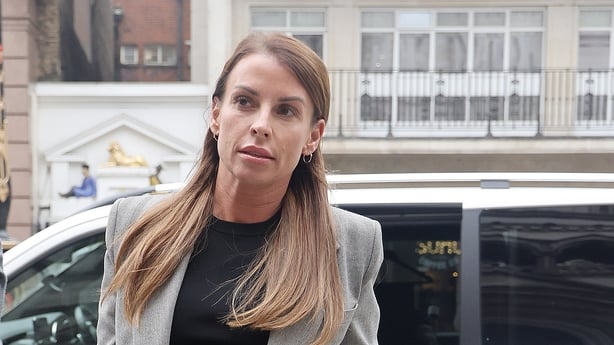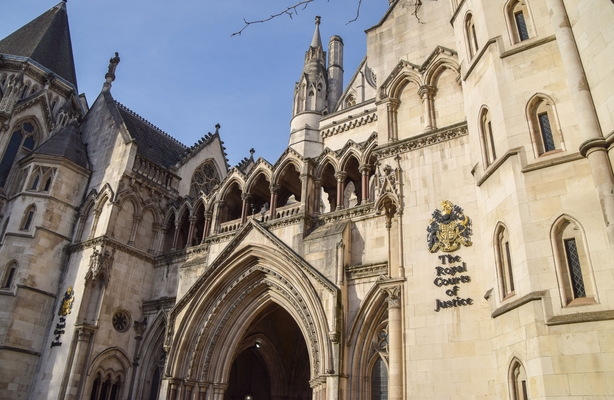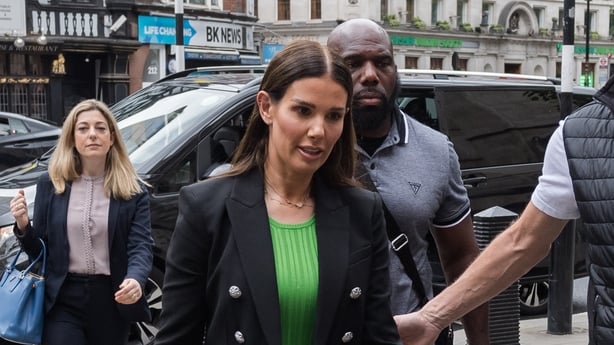Rebekah Vardy has lost the 'Wagatha Christie' libel battle against Coleen Rooney over a viral social media post, after a High Court judge in London found it was "substantially true".
Vardy is facing up to £3 million in legal costs following Friday's ruling.
In the viral post in October 2019, Rooney, 36, said she had carried out a "sting operation" and accused Vardy, 40, of leaking "false stories" about her private life to the press.
The wife of former England star Wayne Rooney publicly claimed Vardy's account was the source behind three fake stories she had posted on her private Instagram account.

Vardy, who is married to Leicester City striker Jamie Vardy, denied leaking the stories and sued her fellow footballer's wife for libel. Rooney defended the claim on the basis her post was "substantially true".
In her ruling, Mrs Justice Steyn said it was "likely" that Vardy's agent at the time, Caroline Watt, "undertook the direct act" of passing the information to The Sun.
But she continued: "Nonetheless, the evidence ... clearly shows, in my view, that Mrs Vardy knew of and condoned this behaviour, actively engaging in it by directing Ms Watt to the private Instagram account, sending her screenshots of Mrs Rooney's posts, drawing attention to items of potential interest to the press, and answering additional queries raised by the press via Ms Watt."
The judge added: "In my judgment, the conclusions that I have reached as to the extent to which the claimant engaged in disclosing to The Sun information to which she only had access as a permitted follower of an Instagram account which she knew, and Mrs Rooney repeatedly asserted, was private, suffice to show the single meaning is substantially true."
We need your consent to load this rte-player contentWe use rte-player to manage extra content that can set cookies on your device and collect data about your activity. Please review their details and accept them to load the content.Manage Preferences
While Rooney's truth defence succeeded, Mrs Justice Steyn dismissed Rooney's second defence of public interest in the claim brought by Vardy.
She said "it was not reasonable to believe that it was in the public interest to publish the reveal post without taking any steps to put the allegation to Mrs Vardy and give her an opportunity to respond".
In her 76-page judgment, Mrs Justice Steyn said Vardy's evidence was "manifestly inconsistent" with contemporaneous documentary evidence on "many occasions".
She continued: "I bear in mind when assessing her evidence the degree of stress she was naturally feeling, given the high-profile nature of the trial, the abuse that she has suffered since the reveal post was published, and the length of time she was in the witness box."
The judge added: "Nevertheless, I find that it is, unfortunately, necessary to treat Mrs Vardy's evidence with very considerable caution."
Mrs Justice Steyn said that Rooney was "an honest and reliable witness" when she gave evidence at the High Court in London in May.

She said in her ruling: "She sought to answer the questions she was asked without any evasion, and without conveying any sense that she was giving pre-prepared answers.
"Her evidence was consistent with the contemporaneous evidence and with the evidence given by her witnesses."
Welcoming the ruling, Rooney said: "It was not a case I ever sought or wanted. I never believed it should have gone to court at such expense in times of hardship for so many people when the money could have been far better spent helping others."
Reacting to losing the case, Vardy said: "It is not the result that I had expected, nor believe was just. I brought this action to vindicate my reputation and am devastated by the judge's finding."

Over seven days in courtroom number 13 at the Royal Courts of Justice in London in May, the two footballers' wives each gave evidence as revelations from the case made daily headlines.
During the trial, Rooney's barrister David Sherborne argued that Vardy had a "habitual and established practice" of leaking information about those she knew – through her friend and former agent Caroline Watt – to The Sun newspaper.
Discussing Rooney's viral "reveal" post, her barrister added: "It is what she believed at the time… and it is what she believes even more so now that we have got to the end of the case."
However, Hugh Tomlinson QC, for Vardy, said Rooney had "failed to produce any evidence" that Vardy had "regularly and frequently abused her status as a trusted follower" of her private Instagram account by passing on information from it to The Sun.
Tomlinson said the libel battle was a "very simple case" when "one clears away the conspiracy theories".
He added: "Mrs Vardy's case is and always has been that she did not leak the information nor did she authorise anyone else to leak.
"She does not know to this day what happened. She does not know where this information came from."
The barrister added that Vardy suffered "very serious harm to her reputation" as a result of Rooney's post.
Analysis

The verdict would not come as a surprise, as Rebekah Vardy did not fare well in the witness box.
Now she is facing legal costs of up to £3 million and serious reputational damage after a High Court judge described her as "not credible", "implausible" and capable of "self-deception".
Mrs Vardy had broken down crying three times under cross-examination during the libel trial where she was accused of lying to the court and destroying evidence - accusations now supported by the judge's ruling.
In her judgment, Mrs Justice Steyn described Mrs Vardy's evidence on a number of occasions as "not credible". In particular, she said, the loss of crucial evidence was "not accidental". She said that Mrs Vardy would not concede facts "no matter how implausible her evidence".
During the trial, Mrs Vardy tried to blame the leaking of private Instagram posts on her agent Caroline Watt. However, Mrs Justice Steyn ruled that although her agent may have physically given the stories to the press, it was done with Mrs Vardy's knowledge and approval.
Ms Watt was not available to answer questions in court because of her "fragile state", according to Mrs Vardy's lawyers, and a psychiatric report was submitted to explain why she could not give evidence in person.
It was Ms Watt who claimed to have lost crucial evidence in the case when she dropped her mobile phone containing WhatsApp messages into the North Sea while on a ferry trip.
Mrs Vardy said that WhatsApp messages on her own phone were accidentally deleted when her laptop crashed while she was trying to upload them to her lawyers.
A laptop used to export the messages was broken and "disposed of", the court heard.
When asked why a further nine months of messages between herself and Ms Watt had been deleted, Mrs Vardy replied it must have happened when she switched phones.
The judge found that the loss of evidence was "not accidental" and also that the reason Ms Watt did not come to court to give evidence "was that she knew that to a large extent the evidence in her statements was untrue".
The judge said Mrs Vardy was indignant about being accused of leaking the stories, not because she did not do it but due to a number of factors including "self-deception" and her belief that the stories were harmless.
It is being reported that Coleen Rooney offered to settle the case four times.
Now Rebekah Vardy, who embarked on a three-year legal battle and insisted on taking the case to the High Court, is left with massive legal costs.
Source: Press Association
